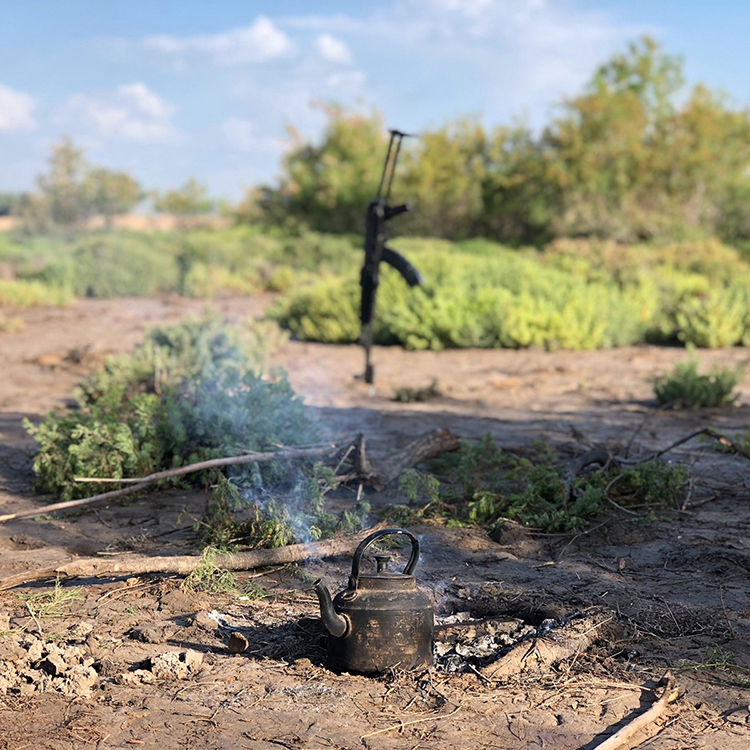Seven Penn Medicine Scientists: National Institutes of Health Director’s Awards
For the second year in a row, the National Institutes of Health (NIH) has selected seven researchers from the University of Pennsylvania to receive its prestigious Director’s Awards, part of the NIH’s High-Risk, High-Reward Research Program; for last year’s winners see Almanac October 16, 2018. The initiative—designed to fuel research endeavors that are more open-ended and have a potentially broader effect on scientific understanding compared to more traditional research—presents awards to scientists in four categories to support research over a five-year period.
A total of 93 High-Risk, High-Reward awards are being granted this year, each award category has at least one Penn Medicine recipient.


Pioneer Award
James Eberwine, the Elmer Holmes Bobst Professor of Pharmacology, will receive up to $3.5 million to investigate RNA structure within single cells in cortex and hippocampus tissue in the brains of mice and humans. Traditional isolation of RNA for research purposes changes its makeup, and therefore, the intracellular forms of RNA are not well understood. By uniquely analyzing natural structural changes of RNA and also how RNA structure can be manipulated, Dr. Eberwine’s work may influence the development of future therapies. This is Dr. Eberwine’s second Pioneer Award, having also won in 2008 (Almanac September 30, 2008); he is one of only five people to be awarded the grant more than once.
Early Independence Award
Sydney Shaffer, assistant professor of pathology and laboratory medicine and assistant professor of bioengineering, has been awarded up to $1.25 million. Building on her previous work in melanoma, her research will focus on rare resistant or invasive cancer cells and using new ways to illuminate RNA signatures in those cells. This research has the potential to lead to novel treatments of these highly dangerous cancer cells.
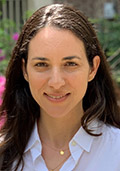


New Innovator Award
Maayan Levy, assistant professor of microbiology, will receive $2.4 million total over five years to study new modes of communication between the intestinal microbiome and host immunity. Her lab continues to analyze the communication network between the microbiome and its host and discovered that metabolites act as messengers. This forms the basis for a large number of innovative therapeutic approaches for numerous multi-factorial human diseases.
Ophir Shalem, assistant professor of genetics, will also receive $2.4 million in total over five years for his research, which focuses on the development of functional genomics tools that are based on scalable gene tagging for the direct measurement and perturbation of endogenous proteins. His lab focuses on the development of state-of- the-art functional genomics and gene editing tools and applications for studying a range of disorders including neurodegenerative diseases.
The third Penn Medicine recipient in this category is Christoph A. Thaiss, assistant professor of microbiology and a member of the Institute for Immunology (IFI) and the Institute for Diabetes, Obesity & Metabolism (IDOM). The award, which also comes with funding totaling $2.4 million over five years, will enable Dr. Thaiss and his lab to study the role of amyloid proteins in intestinal host-microbiome interactions. The Thaiss lab studies how environmental signals are integrated into host physiology and how these signals contribute to the development of human disease.
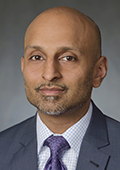
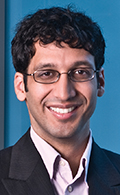
Transformative Research Award
Together, Rajan Jain, assistant professor of medicine and cell and developmental biology and member of the Cardiovascular Institute (CVI) and the Institute for Regenerative Medicine (IRM), and Arjun Raj, professor of bioengineering, will receive over $5 million. These funds will allow their labs to work together to develop new approaches to elucidate factors that control cell identity and how they regulate transdifferentiation approaches. Ultimately, this will allow researchers to more efficiently transform one type of cell into another. Last year, Dr. Jain received a New Innovator Award to advance understanding of how 3D genome organization regulates organ development and homeostasis (Almanac October 16, 2018).
$1.15 Million Gift to ICA
 The Institute of Contemporary Art (ICA) at the University of Pennsylvania announced a $1.15 million gift from an anonymous donor that will endow the director of public engagement position. The role, now titled the DAJ Director of Public Engagement, is currently held by James E. Britt, Jr., and was established in 2016 to deepen the institution’s connections to local and student communities and build on ICA’s commitment to engaging wider audiences. The gift marks a significant milestone for the internationally acclaimed contemporary art institution and will also provide unrestricted annual support for ICA’s programming. Additionally, it will support a travel fund for undergraduate students, named the DAJ Student Travel Fund, in the department of the history of art in SAS to enable academic research and immersion in the arts on a global scale.
The Institute of Contemporary Art (ICA) at the University of Pennsylvania announced a $1.15 million gift from an anonymous donor that will endow the director of public engagement position. The role, now titled the DAJ Director of Public Engagement, is currently held by James E. Britt, Jr., and was established in 2016 to deepen the institution’s connections to local and student communities and build on ICA’s commitment to engaging wider audiences. The gift marks a significant milestone for the internationally acclaimed contemporary art institution and will also provide unrestricted annual support for ICA’s programming. Additionally, it will support a travel fund for undergraduate students, named the DAJ Student Travel Fund, in the department of the history of art in SAS to enable academic research and immersion in the arts on a global scale.
Since joining ICA in 2018 as the director of public engagement, Mr. Britt has implemented a number of new initiatives, such as Pennsight, a student docent program designed to enhance visual acuity and establish authentic engagement between the viewer and the Institution’s exhibitions. Mr. Britt has also provided platforms for Penn students to combine their academic and extracurricular interests with contemporary art through an expanded student board, performances, symposiums and other opportunities that allow for the incubation process to unfold. Mr. Britt works collaboratively with interim Daniel W. Dietrich, II Director John McInerney and the curatorial department to further integrate ICA’s curatorial program within the curriculum of the University of Pennsylvania’s 12 schools and continues to strengthen and build new partnerships with civic, educational and cultural institutions throughout the city. He also oversees a range of public outreach programs, including lectures and workshops, and is working to improve the overall visitor experience at the museum for all audiences.
“ICA is extremely grateful to this anonymous donor for making such a visionary gift,” said Mr. McInerney. “Finding innovative and meaningful ways to engage with a diverse and wider public is central to our mission. As our DAJ Director of Public Engagement, James will now be able to significantly strengthen connections between ICA and the University while also expanding our partnerships and collaborations with communities throughout Philadelphia.”
From the President and Provost: On the Results of the AAU Campus Climate Survey on Sexual Assault and Sexual Misconduct
Dear Members of the Penn Community:
Ensuring the safety of Penn students is among our highest priorities. No one should experience sexual misconduct on campus. Despite our best efforts, sexual assault continues to be endemic. Penn has taken numerous steps to protect and support our students, including strengthening our policies, educating for prevention and increasing our resources to provide education and respond to reports.
Last spring, Penn was one of 33 colleges and universities that participated in the second administration of the Association of American Universities’ Campus Climate Survey on Sexual Assault and Sexual Misconduct. Penn also participated in the first AAU survey in the spring of 2015. Our goals in both cases were to learn more from our undergraduate, graduate and professional students about sexual misconduct on campus, assess our education and prevention strategies and guide our efforts moving forward. We write today to share information about the follow-up survey, the results of which were released by AAU.
We thank our great Penn students for the much higher response rate this year than in 2015, which offers us a much fuller understanding of our students’ experiences. The 10,306 students who responded represented 42.8% of our enrollment, compared to a response rate of 26.9% in 2015 and an overall AAU response rate for this survey of 21.9%. However, we are troubled that there was little change in the prevalence of non-consensual/unwanted sexual contact reported by our students.
Penn’s figures are almost exactly at the median of our peers. But there is no comfort in that. The numbers are disturbing—25.9% of female undergraduate students in this year’s survey experienced unwanted sexual contact, down from 27.2% in 2015. Among male undergraduate students, the figure rose from 5.5% to 7.3%; among undergraduate students who are transgender, genderqueer and non-binary (TGQN), it increased from 19% to 21.5%. Among graduate students, the figure for female students rose from 6.5% to 7.5%, and for male students it rose from 2.1% to 2.7%.
We urge all members of the Penn community to read the full results of the survey, which can be found at http://www.upenn.edu/ir/aau-campus-climate-survey.html As we all better understand the scope of the problem, we might better work together to lessen the risk that any student may face. We also want to remind anyone who has experienced sexual misconduct—or knows someone who has experienced it—of the confidential resources available on campus:
- African-American Resource Center (resource for students, staff or faculty)
- Counseling and Psychological Services, including its Sexual Trauma Treatment Outreach and Prevention team also known as STTOP (resource for students)
- Employee Assistance Program (resource for staff or faculty)
- Lesbian Gay Bisexual Transgender Center (resource for students, staff or faculty)
- Office of the University Chaplain (resource for students, staff, faculty or visitors)
- Office of the Ombuds (resource for students, staff or faculty)
- Penn Violence Prevention (resource for students)
- Penn Women’s Center (resource for students, staff or faculty)
- Special Services Department, Division of Public Safety
- (resource for students, staff, faculty or visitors)
- Student Health Service (resource for students)
If you have any doubt about where to turn, Penn’s HELP Line is available 365 days a year, 24 hours a day at (215) 898-HELP.
Sexual misconduct is absolutely unacceptable. The AAU survey makes clear the extent of the challenge and the need to reaffirm education, prevention, and support on our campus.
We encourage all members of our community to learn more about our Sexual Misconduct Policy and the resources available at Penn. It is our collective responsibility to create a shared campus environment in which every student can fulfill their fullest potential.
—Amy Gutmann, President
—Wendell Pritchett, Provost
Call for Honorary Degree Nominations: December 13
Dear Colleagues,
We invite you to nominate candidates to receive honorary degrees from the University of Pennsylvania at the 2020 Commencement ceremony and beyond. Candidates should exemplify the highest ideals of the University, which seek to educate those who will change the world through innovative scholarship, scientific discovery, artistic creativity and/or societal leadership.
We encourage you to involve your faculty colleagues, within and across departments and schools, in the nomination process. Nominations should detail how nominees meet the criteria for selection and outline the nominees’ achievements and contributions. Please include as much biographical and other supporting information as possible, but do not contact the nominees, who should not know that they are being considered. We particularly encourage nominations from departments and schools whose fields have not been recognized by the awarding of honorary degrees in recent years. Please note that it is University policy not to consider Penn standing faculty, Trustees, or school and center overseers for Penn honorary degrees. Nominations for the University Commencement speaker are also considered through this honorary degrees selection process.
Nominations are welcome any time, but for consideration by this year’s University Council Honorary Degrees Committee, it would be helpful to have them in hand by December 13. Review is ongoing and candidates may ultimately be selected several years after their initial nominations. The University Council Committee’s recommendations are forwarded to the Trustee Committee on Honorary Degrees and Awards for final selection. A list of previous University of Pennsylvania honorary degree recipients can be found at: https://secretary.upenn.edu/ceremonies/honorary-degree-recipients
Please send signed letters of nomination on your official stationery to: University Council Committee on Honorary Degrees, c/o Office of the University Secretary, 1 College Hall, Room 211/6303. Additional information on the honorary degrees process and an online nomination form can be found at: https://secretary.upenn.edu/ceremonies/honorary-degree-nominations If you have any questions, please contact Antoine Jones at jonesan@upenn.edu or (215) 898-7005.
Penn emeritus faculty are eligible to receive honorary degrees through a special nomination process. University deans propose candidates for consideration by the Council of Deans. The Council’s nominations are then reviewed by the President and Provost and final selection is made by the Trustee Committee on Honorary Degrees and Awards.
Honorary degrees are important statements of Penn’s values and aspirations, and we strongly encourage your participation in this process.
––Amy Gutmann, President
––Daniel Raff, Chair, University Council Committee on Honorary Degrees
Kevin Turner: Chair of MEAM for the School of Engineering
 Kevin T. Turner has been named chair of the department of mechanical engineering and applied mechanics (MEAM) for the School of Engineering and Applied Science. Dr. Turner, who also has an appointment in the department of materials science and engineering, joined Penn Engineering in 2011 and has served as director of the Quattrone Nanofabrication Facility at the Singh Center and as the Graduate Group chair of MEAM.
Kevin T. Turner has been named chair of the department of mechanical engineering and applied mechanics (MEAM) for the School of Engineering and Applied Science. Dr. Turner, who also has an appointment in the department of materials science and engineering, joined Penn Engineering in 2011 and has served as director of the Quattrone Nanofabrication Facility at the Singh Center and as the Graduate Group chair of MEAM.
Dr. Turner has earned numerous honors and awards, including ASME Sia Nemat-Nasser Early Career Award, the Adhesion Society’s Young Adhesion Scientist Award, SME’s Outstanding Young Manufacturing Engineer Award, an NSF CAREER Award, a 3M Non-tenured Faculty Award, and he was named an ASEE Ferdinand P. Beer and E. Russell Johnston Jr. Outstanding New Mechanics Educator.
Dr. Turner’s research is at the nexus of mechanics, manufacturing and materials, with a particular emphasis on problems involving small-scale systems and interfaces. He has extensive experience in the mechanics of adhesion and fracture, micro and nano systems, and advanced manufacturing. His group employs a combination of experimental and computational approaches in nearly all projects. Ongoing research efforts include structured materials with controllable adhesion and fracture behavior, additive manufacturing of cellulose nanomaterials, soft robotic grasping, nanocomposites and manufacturing of flexible hybrid electronics and sensors.
He has recently received a Manufacturing PA Innovation grant from the State of Pennsylvania (Almanac September 17, 2019). His project will investigate the use of cellulose materials in inks for additive manufacturing, broadening the materials choices for 3D printing.
A New Name—and a New Era—for Wharton School Book Publishing
The book publishing arm of Wharton School at Penn is changing its name from Wharton Digital Press to Wharton School Press.
“Wharton School Press has made a significant impact on behalf of the school since it first launched as Wharton Digital Press. We’re very excited about this new direction, which emphasizes the school’s continued commitment to publishing important books,” said Dean Geoffrey Garrett.
“This change underscores the Wharton School name, a key selling point for readers seeking trusted information and for authors looking for a prestigious publishing partner,” said Peter Fader, Frances and Pei-Yuan Chia Professor and Chair of Wharton School Press’s Faculty Advisory Board. “In our conversations with stakeholders, including faculty and authors, we heard time and again that the Wharton School’s name is among our greatest strengths. This evolution will enable the Press to make an even greater impact in the years ahead.”
The Press was launched in 2011 by Stephen J. Kobrin, William H. Wurster Emeritus Professor of Multinational Management, who retired from his role as executive director in 2018. At its inception, the Press set out to leverage emerging digital publishing technologies to position the Wharton School on the leading-edge of experimentation in learning and as a forward-thinking innovator. While many business-school presses experimented, the Wharton School was the first and only business school to launch a digital book press dedicated exclusively to exploring the unique opportunities presented by these changes.
“The spirit of innovation and experimentation with which the Press was launched will continue to be central to the Press’s work,” said Shannon Berning, director and publisher, Wharton School Press. “We will also continue to publish a select list of research-driven, fast-reading and actionable business books and operate the Wharton School Press Bookstore, which features a curated selection of thought-leading books by Wharton faculty.”
The name change points to digital publishing’s pivot from an innovative new technology to an enduring method for delivering excellent content to readers globally. The Press has matured with the industry, going from an innovative publishing experiment to an established operation making a global impact.
Wharton School Press features a growing pipeline of high-profile, award-winning and bestselling books from a wide range of thought leaders, including Wharton professors Peter Fader, Barbara Kahn, Michael Useem and Kevin Werbach, as well as outside experts, including The New York Times-bestselling author Charlene Li, Penn President Emerita Judith Rodin and technology entrepreneur and academic Vivek Wadhwa. The books, distributed and sold globally, have garnered honors including Economist Book of the Year and coverage in The Wall Street Journal, The New York Times. Wharton School Press has a strong list slated for 2020 that will soon be announced.
Meg Onli: Andrea B. Laporte Associate Curator at ICA
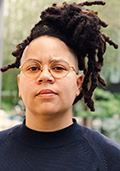 John McInerney, interim Daniel W. Dietrich, II Director at the Institute of Contemporary Art at the University of Pennsylvania, recently announced the promotion of Meg Onli as the Andrea B. Laporte Associate Curator.
John McInerney, interim Daniel W. Dietrich, II Director at the Institute of Contemporary Art at the University of Pennsylvania, recently announced the promotion of Meg Onli as the Andrea B. Laporte Associate Curator.
Ms. Onli’s work attends to the intricacies of language and race. She joined ICA in 2016 as assistant curator and in 2017 curated the critically acclaimed exhibition Speech/Acts, which explored how black American experiences have been shaped by the social and cultural constructs of language. The recent opening of Ms. Onli’s latest exhibition, Banal Presents marks the realization of the final chapter of Colored People Time, a pioneering three-part presentation exploring race, history and time over the course of a year. In 2019, Ms. Onli was awarded the Transformation Award from the Leeway Foundation in recognition of her achievements and is currently a Warhol Foundation Curatorial Fellow.
“I am thrilled to announce Meg’s new position as the Andrea B. Laporte Associate Curator,” said Mr. McInerney. “Meg has been an invaluable member of the ICA curatorial team since 2016 and this appointment is a well-deserved recognition of her talent and achievements. Her work examining the intricacies of race, language and power has brought an important and exciting voice into the institution.”
DRC Pilot and Feasibility Grant Program: December 9
The Diabetes Research Center (DRC) of the University of Pennsylvania is now accepting applications for support to perform pilot and feasibility studies in diabetes and related endocrine and metabolic disorders.
The application deadline is Monday, December 9, 2019 by 5 p.m.
The P&F program is intended to support new investigators and established investigators new to diabetes research. Established diabetes investigators pursuing high impact/high risk projects or projects that are a significant departure from their usual work are also eligible for support under the DRC P&F program. Applications are welcome from basic, clinical and translational investigators.
Grants will be reviewed by the DRC Pilot and Feasibility Review Committee, as well as internal and external reviewers. Funding level maximum is $50,000.
For detailed information and instructions: https://www.med.upenn.edu/idom/drc/pilots.html
Investigators who are currently in the first year of support through this P&F program may reapply for an additional year of funding. Continuation requests need to be carefully justified and will be considered as competing renewals.
For more information please contact Lisa Henry at henryli@pennmedicine.upenn.edu; (215) 898-4365 or Doris Stoffer at stoffer@pennmedicine@upenn.edu or (215) 573-5413.
Rare Disorders Pilot Grant Program: November 4
The Orphan Disease Center at the University of Pennsylvania, in partnership with the ZC4H2 Deficiency Research Foundation, is pleased to announce the ZC4H2-Associated Rare Disorders (ZARD) Pilot Grant Program, offering up to three one-year awards at $50,000, each. This funding opportunity is open to the international community.
Overview:
Pathogenic mutations in the zinc finger C4H2-type gene (ZC4H2) are associated with a neurodevelopmental and neuromuscular disorder often diagnosed as a form of arthrogryposis multiplex congenita. ZC4H2 is a protein-coding gene located on the X-chromosome and the mechanism by which ZC4H2 mutations lead to disease remain unclear. Due to the key clinical features of both males and females with these mutations, there is a growing recognition of this condition as a unique disorder that should be clinically recognized as ZARD. Recent research has found that due to variation in X-inactivation or the presence of significant mutations in ZC4H2 (such as full deletions), females may also present with a form of the disease, albeit less severe than male ZC4H2 patients. It is believed that the pathogenic variants of ZC4H2 may result in impairment of the central and peripheral nervous system through the impairment of neurologic development.
They are seeking grant applications that progress the understanding of ZC4H2 basic biology or development of treatments and/or a cure for ZARD. While the RFA is broad in scope, priority will be given to grants that cover the following areas:
- Unbiased approaches to discovering the protein function of ZC4H2, including, but not limited to, rescue, modifier or synthetic lethal screens in genetically tractable model organisms
- Molecular characterization of ZC4H2 and the effect of mutations on molecular and protein function using in vitro and in in vivo models (mouse and human where possible):
-identification and characterization of naturally occurring transcripts, including splice isoforms
-spatio-temporal expression patterns of wildtype ZC4H2 expression at RNA and protein level (i.e. developmental time course and tissue- and cell type-specific expression of RNA and protein; cellular sub-localization of protein)
- Discovery and validation of druggable targets or pathways for ZC4H2 treatment. Pilot data should be already established. This grant would focus on validating the approach in a translatable experiment with clear Go/ No Go experiments.
Letter of Interest Instructions:
Visit the Center’s website to submit your Letter of Interest (LOI). This one-page LOI is due no later than Monday, November 4, by 8 p.m.








 The Institute of Contemporary Art (ICA) at the University of Pennsylvania announced a $1.15 million gift from an anonymous donor that will endow the director of public engagement position. The role, now titled the DAJ Director of Public Engagement, is currently held by James E. Britt, Jr., and was established in 2016 to deepen the institution’s connections to local and student communities and build on ICA’s commitment to engaging wider audiences. The gift marks a significant milestone for the internationally acclaimed contemporary art institution and will also provide unrestricted annual support for ICA’s programming. Additionally, it will support a travel fund for undergraduate students, named the DAJ Student Travel Fund, in the department of the history of art in SAS to enable academic research and immersion in the arts on a global scale.
The Institute of Contemporary Art (ICA) at the University of Pennsylvania announced a $1.15 million gift from an anonymous donor that will endow the director of public engagement position. The role, now titled the DAJ Director of Public Engagement, is currently held by James E. Britt, Jr., and was established in 2016 to deepen the institution’s connections to local and student communities and build on ICA’s commitment to engaging wider audiences. The gift marks a significant milestone for the internationally acclaimed contemporary art institution and will also provide unrestricted annual support for ICA’s programming. Additionally, it will support a travel fund for undergraduate students, named the DAJ Student Travel Fund, in the department of the history of art in SAS to enable academic research and immersion in the arts on a global scale.  Kevin T. Turner has been named chair of the department of mechanical engineering and applied mechanics (MEAM) for the School of Engineering and Applied Science. Dr. Turner, who also has an appointment in the department of materials science and engineering, joined Penn Engineering in 2011 and has served as director of the Quattrone Nanofabrication Facility at the Singh Center and as the Graduate Group chair of MEAM.
Kevin T. Turner has been named chair of the department of mechanical engineering and applied mechanics (MEAM) for the School of Engineering and Applied Science. Dr. Turner, who also has an appointment in the department of materials science and engineering, joined Penn Engineering in 2011 and has served as director of the Quattrone Nanofabrication Facility at the Singh Center and as the Graduate Group chair of MEAM. John McInerney, interim Daniel W. Dietrich, II Director at the Institute of Contemporary Art at the University of Pennsylvania, recently announced the promotion of Meg Onli as the Andrea B. Laporte Associate Curator.
John McInerney, interim Daniel W. Dietrich, II Director at the Institute of Contemporary Art at the University of Pennsylvania, recently announced the promotion of Meg Onli as the Andrea B. Laporte Associate Curator.
 The annual Penn in the Field photography competition took place earlier this semester, just as students were returning to campus from their summer travels. “These photographs represent the extraordinary and varied fieldwork that Penn students do all around the world,” said Deborah Brown Stewart, head of the Penn Museum Library. “And they underscore the opportunities available to Penn students to travel into regions they’ve been learning about in the classroom, to get direct experience with the work they’re considering as careers.”
The annual Penn in the Field photography competition took place earlier this semester, just as students were returning to campus from their summer travels. “These photographs represent the extraordinary and varied fieldwork that Penn students do all around the world,” said Deborah Brown Stewart, head of the Penn Museum Library. “And they underscore the opportunities available to Penn students to travel into regions they’ve been learning about in the classroom, to get direct experience with the work they’re considering as careers.”